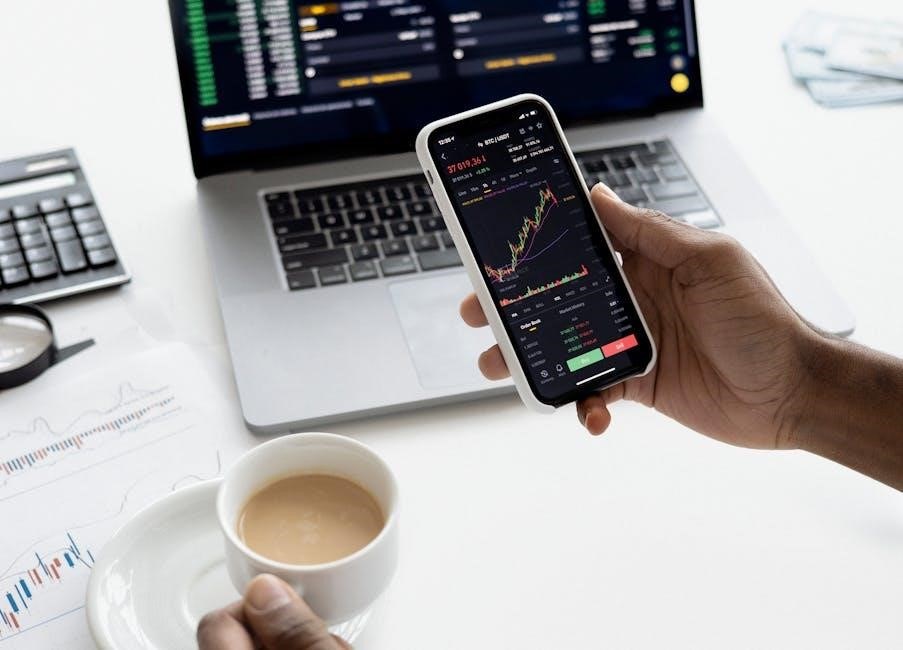Freakonomics explores the hidden side of economics, applying data analysis to unconventional topics. Written by Steven Levitt and Stephen Dubner, it challenges traditional views, offering fresh insights into human behavior and decision-making. The Freakonomics PDF has become a popular resource, making complex concepts accessible and engaging for a broad audience.
1.1 Definition and Core Concepts
Freakonomics is a groundbreaking approach that applies economic principles to unconventional topics. Coined by Steven Levitt and Stephen Dubner, it explores how incentives, data, and human behavior shape decisions. The concept challenges traditional thinking by uncovering hidden patterns and motivations behind everyday events. By analyzing data creatively, Freakonomics reveals surprising insights into topics like crime, education, and personal choices. Its core idea is to question assumptions and uncover the “hidden side of everything” through innovative, data-driven perspectives.
1.2 The Authors: Steven Levitt and Stephen Dubner
Steven Levitt, a renowned economist, and Stephen Dubner, a journalist, co-authored Freakonomics. Levitt’s expertise in economic theory and Dubner’s storytelling ability created a unique blend of data-driven insights and engaging narratives. Their collaboration challenged conventional wisdom, making complex ideas accessible. The Freakonomics PDF has further amplified their reach, allowing readers worldwide to explore their groundbreaking perspectives. Together, they continue to influence public discourse through books, podcasts, and other media, fostering a deeper understanding of economics in everyday life.
1.3 The Book’s Impact and Popularity
Freakonomics became a global phenomenon, challenging traditional economic theories. Its unique approach to real-world issues resonated widely, making it a bestseller. The Freakonomics PDF further expanded its reach, enabling easy access to its groundbreaking ideas. By blending data analysis with engaging storytelling, the book appealed to academics and general readers alike. Its influence extended beyond economics, impacting popular culture and inspiring new perspectives on decision-making and behavior. The book’s success also led to a podcast and other media, cementing its place as a modern intellectual landmark.
Key Principles of Freakonomics
Freakonomics relies on incentives, unconventional data analysis, and moral dilemmas to explain human behavior. It challenges traditional norms, revealing hidden patterns in economics and everyday life.
2.1 The Power of Incentives
Incentives are central to Freakonomics, driving human behavior in predictable ways. By analyzing rewards and penalties, Levitt and Dubner reveal how motivations shape actions. Understanding incentives helps explain why people make certain choices, from crime to education. This principle is explored through real-world examples, showing how subtle changes in incentives can lead to significant behavioral shifts and policy outcomes.
2.2 Unconventional Data Analysis
Freakonomics employs unconventional data analysis to uncover hidden patterns and correlations. By examining unexpected datasets, Levitt and Dubner challenge traditional assumptions. This approach reveals surprising insights, such as the link between crime rates and abortion, or the impact of names on life outcomes. Their innovative use of data demonstrates how economics can be applied to seemingly unrelated fields, offering fresh perspectives on complex social issues.
2.3 The Role of Morality and Ethics
Freakonomics often challenges traditional moral and ethical perspectives by examining how incentives influence behavior. The book raises questions about the morality of certain policies and decisions, highlighting the tension between what is right and what is effective. It encourages readers to think critically about ethical dilemmas, such as the unintended consequences of well-intentioned laws or the moral implications of data-driven decision-making. While Freakonomics doesn’t provide clear answers, it sparks important conversations about the interplay of ethics and economics;
Freakonomics in Practice
Freakonomics applies economic principles to real-world issues, offering insights into decision-making and incentives. Its practical applications span education, policy-making, and everyday life, bridging theory and action effectively.
3.1 Real-World Applications of Freakonomics
Freakonomics applies economic principles to real-world scenarios, offering unconventional solutions. For instance, it examines how incentives influence behavior in education, crime reduction, and healthcare. By analyzing data creatively, Freakonomics reveals hidden patterns, helping policymakers and individuals make informed decisions. Its practical insights are widely used in urban planning, environmental conservation, and even everyday life, demonstrating the versatility of economic thinking beyond traditional domains. The Freakonomics PDF highlights these applications, making complex ideas accessible for practical implementation across various fields.
3.2 Case Studies from the Book
The Freakonomics PDF provides compelling case studies, such as the cheating habits of sumo wrestlers and teachers, revealing how incentives drive unethical behavior. It also explores the economics of naming children, showing how names influence life outcomes. Another notable case study examines the decline of the Ku Klux Klan, highlighting how economic incentives and social pressures dismantled the group. These examples demonstrate the power of Freakonomics in uncovering hidden patterns and challenging conventional wisdom, offering practical lessons for understanding human behavior and decision-making in diverse contexts. The book’s unique approach makes these insights both accessible and engaging.
3.3 Freakonomics and Behavioral Economics
Freakonomics aligns with behavioral economics by exploring how psychological, social, and emotional factors influence decision-making. It challenges traditional economic theories by emphasizing real-world complexities. The Freakonomics PDF highlights how incentives, biases, and heuristics shape choices, often leading to irrational outcomes. By blending data-driven insights with behavioral principles, Freakonomics offers a unique perspective on understanding human behavior in economic contexts. This approach bridges the gap between conventional economics and the nuances of real-life decisions, providing practical applications for policy-making and everyday choices. Its interdisciplinary nature makes it a valuable resource for understanding modern economic behavior.
The Freakonomics PDF and Digital Resources
The Freakonomics PDF offers a convenient and accessible way to explore the book’s insights. Available on various platforms, it provides ease of reading and reference, enhancing the learning experience with digital features.
4.1 Availability and Accessibility
The Freakonomics PDF is widely available on various online platforms, including Amazon, Google Books, and academic databases, making it easily accessible to a global audience. Its digital format ensures compatibility with multiple devices, such as e-readers, tablets, and smartphones, allowing readers to access the content anytime and anywhere. Additionally, features like adjustable font sizes and bookmarks enhance readability and navigation, making the PDF a convenient and user-friendly option for those interested in exploring the book’s unique insights into economics and human behavior.
4.2 Benefits of the Digital Format
The Freakonomics PDF offers numerous advantages, including portability across devices and easy access to content. Digital formats enable features like search functionality, bookmarks, and adjustable font sizes, enhancing readability. Hyperlinks provide quick access to references or additional resources, enriching the learning experience. The digital version also reduces the need for physical storage, making it environmentally friendly. Furthermore, it allows for cost-effective distribution and ensures that the content remains up-to-date with potential updates. These benefits make the Freakonomics PDF a practical and efficient way to engage with the book’s insights.
4.3 Supplementary Materials and Tools
The Freakonomics PDF often includes supplementary materials like interactive graphs, datasets, and study guides. These tools enhance understanding by providing visual representations of key concepts and allowing readers to explore data themselves. Additionally, some versions include discussion forums or Q&A sections, fostering engagement and deeper analysis. Multimedia content, such as video summaries or author interviews, further enriches the learning experience. These resources make the Freakonomics PDF a comprehensive and dynamic resource for both casual readers and academic use, catering to diverse learning styles and preferences.
Criticisms and Controversies
Freakonomics has faced criticism for oversimplifying complex issues and raising ethical concerns. Its unconventional approaches have sparked debates about methodology and the limits of economic analysis.
5.1 Critique of Methodologies
Critics argue that Freakonomics often oversimplifies complex social phenomena, relying on selective data and anecdotal evidence. Some economists question the validity of its unconventional approaches, suggesting they lack rigorous scientific grounding. The reliance on correlational studies has also been a point of contention, with many pointing out that correlation does not necessarily imply causation. Despite its engaging narrative, the methodology has sparked debates about the limitations of applying economic principles to non-traditional fields, raising concerns about the broader implications of such analyses.
5.2 Ethical Concerns and Backlash
Freakonomics has faced ethical criticism for its controversial interpretations of data. Some argue that its methods trivialized serious issues, such as the link between abortion and crime rates, sparking moral debates. Critics accuse the authors of prioritizing sensationalism over ethical rigor, potentially misleading readers. Public and academic backlash has highlighted concerns about the responsible use of data and the presentation of findings without sufficient context. These criticisms underscore the ethical challenges of applying economic analysis to sensitive social topics, raising questions about the implications of such approaches.
5.3 Responses to Criticism
Steven Levitt and Stephen Dubner have responded to criticism by emphasizing their commitment to data-driven inquiry. They argue that their unconventional approach is meant to provoke thought, not to undermine traditional economics. While some critics accuse them of sensationalism, the authors maintain that their work encourages transparency and challenges assumptions. The Freakonomics PDF and related materials remain popular, with many praising their ability to make complex ideas accessible. Despite backlash, the book’s influence endures, sparking debates and inspiring new perspectives across various fields.
The Evolution of Freakonomics
Freakonomics has expanded through updated editions, spin-offs like SuperFreakonomics, and a popular podcast. The Freakonomics PDF and digital resources continue to spread its innovative ideas globally.
6.1 Later Editions and Updates
The original Freakonomics book has spawned several updated editions, including SuperFreakonomics and Think Like a Freak, which expand on its core ideas. These later editions incorporate new data, fresh case studies, and evolving perspectives on human behavior and economics. The Freakonomics PDF versions of these books have made the content more accessible, allowing readers to engage with the material digitally. The updates ensure that the concepts remain relevant, addressing contemporary issues and maintaining the series’ reputation for innovative thinking in economics and social sciences.
6.2 Spin-offs and Related Works
Freakonomics has inspired a range of spin-offs, including sequels like SuperFreakonomics and Think Like a Freak, which delve deeper into behavioral economics. The Freakonomics podcast explores similar themes in an audio format, offering fresh insights and real-world applications. Additionally, related works like When to Rob a Bank provide further commentary on economic principles. These spin-offs expand the Freakonomics brand, making its ideas accessible through various mediums and ensuring its relevance in modern discourse on economics and human behavior.
6.3 The Freakonomics Podcast and Other Media
The Freakonomics podcast, hosted by Steven Levitt and Stephen Dubner, explores unconventional economic insights through engaging storytelling. It delves into diverse topics, from crime economics to everyday decision-making, offering fresh perspectives. The podcast has gained a massive following, further popularizing Freakonomics. Other media, such as video series and interviews, complement the podcast, providing visual and interactive approaches to understanding economic principles. These platforms ensure Freakonomics remains accessible and engaging for a wide audience, reinforcing its impact beyond traditional written content.
Freakonomics and Its Influence
Freakonomics has reshaped economics and social sciences by applying data-driven insights to unconventional topics, inspiring new approaches in policy-making, education, and popular culture, fostering critical thinking globally.
7.1 Impact on Economics and Social Sciences
Freakonomics has revolutionized economics by applying data-driven analysis to unconventional topics, challenging traditional theories and encouraging interdisciplinary approaches. It has inspired researchers to explore overlooked areas, fostering innovation in social sciences. By emphasizing incentives and human behavior, Freakonomics has provided fresh perspectives on societal issues, influencing policy-making and academic discourse. Its accessible approach has democratized economic thinking, making complex concepts understandable to a broader audience and sparking new debates in both academic and public spheres.
7.2 Influence on Popular Culture
Freakonomics has significantly influenced popular culture by making economics engaging and accessible. Its unique approach to storytelling has inspired podcasts, TV shows, and public discussions. The Freakonomics Podcast, exploring diverse topics, has attracted a broad audience, fostering a deeper interest in economics. By applying economic principles to everyday life, it has sparked curiosity and debate, encouraging people to think critically about data and decision-making. This cultural impact has made Freakonomics a household name, bridging the gap between academic concepts and mainstream conversation.
7.3 Applications in Education and Policy-Making
Freakonomics has reshaped education and policy-making by encouraging data-driven decision-making. Its principles are used to analyze educational outcomes, teacher incentives, and student performance. Policymakers leverage Freakonomics insights to design interventions addressing social issues like crime and public health. The Freakonomics PDF provides accessible case studies, enabling educators and leaders to apply economic theories to real-world problems. This approach fosters innovation in education and policy, promoting evidence-based solutions and improving societal outcomes. Its impact continues to grow as more professionals adopt its methodologies.



About the author